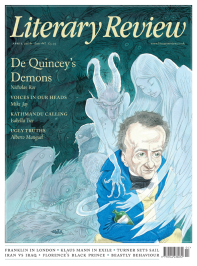Michael Eaude
Decline & Fall
Private Life
By Josep Maria de Sagarra (Translated by Mary Ann Newman)
Archipelago Books 493pp £14.99
Published in 1932, Private Life is one of Catalonia’s best-known works of fiction. In it Josep Maria de Sagarra (1894–1961), himself from an upper-class family, portrays an aristocracy in terminal decline. This is the grand novel of Barcelona’s high society, written with authoritative elegance and rolling, fluent sentences, rooted in the classics. Sagarra achieves a striking contrast between this rich prose and his sordid content. Mary Ann Newman has translated a difficult book with finesse and imagination, for meaning in the original is at times unclear and the language baroque as Sagarra overstretches for obscure vocabulary.
Private Life was one of only three novels that Sagarra wrote. Although criticised on its appearance for its scandalous subject matter, it has become his most famous book on account of its accurate dissection of moral, economic and social decadence and class change. Sagarra had a scintillating literary career in genres other than the novel. He was famous in Catalonia in the 1920s and 1930s as a poet, a translator of Dante and Shakespeare, and a popular author of some twenty-five plays.
Frederic and Guillem de Lloberola are two brothers with expensive tastes who belong to a family of minor aristocrats barely surviving on diminishing rents. Their parents have moved from their city mansion to a modest flat. The walls are bare, for they had to sell every adornment, including the family’s

Sign Up to our newsletter
Receive free articles, highlights from the archive, news, details of prizes, and much more.@Lit_Review
Follow Literary Review on Twitter
Twitter Feed
In 1524, hundreds of thousands of peasants across Germany took up arms against their social superiors.
Peter Marshall investigates the causes and consequences of the German Peasants’ War, the largest uprising in Europe before the French Revolution.
Peter Marshall - Down with the Ox Tax!
Peter Marshall: Down with the Ox Tax! - Summer of Fire and Blood: The German Peasants’ War by Lyndal Roper
literaryreview.co.uk
The Soviet double agent Oleg Gordievsky, who died yesterday, reviewed many books on Russia & spying for our pages. As he lived under threat of assassination, books had to be sent to him under ever-changing pseudonyms. Here are a selection of his pieces:
Literary Review - For People Who Devour Books
Book reviews by Oleg Gordievsky
literaryreview.co.uk
The Soviet Union might seem the last place that the art duo Gilbert & George would achieve success. Yet as the communist regime collapsed, that’s precisely what happened.
@StephenSmithWDS wonders how two East End gadflies infiltrated the Eastern Bloc.
Stephen Smith - From Russia with Lucre
Stephen Smith: From Russia with Lucre - Gilbert & George and the Communists by James Birch
literaryreview.co.uk